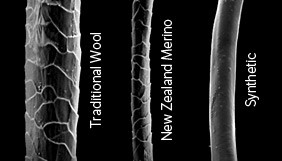There’s an interesting pattern that emerges from perusing the packing lists of long-term (or frequent) backpackers; they end up using eerily identical sorts of gear. You’ll see surprisingly consistent suggestions, such as using down jackets for warmth, traveling with just one pair of do-it-all shoes, using tiny airplane bottles, and so on. I call it the “objectivity funnel.” Despite the broad range of circumstances long-term backpackers run into, there’s an objectively correct answer (at least conceptually) to just about every situation. And one of the most consistently suggested items for travelers of all sorts is a merino wool t-shirt. Everyone will tell you to get one. Or two or three.

There’s a good reason for this. Cotton and polyester, which seemingly comprise 99% of the t-shirt world, have a number of irritating liabilities that simply won’t go away, which become especially problematic when subjected to the sorts of conditions that long-term backpackers often encounter.
- Cotton is incapable of drying quickly, meaning it’ll hold onto moisture all day long, so hand-washing clothes is nearly impossible. If you perspire heavily in the middle of winter, the moisture will stay all over you, sucking body heat away and slowly destroying your soul, a tragedy which I discovered the hard way in a below-freezing Italian winter with inadequate gear. I literally crawled under one of those hand dryers in a random bathroom to warm my chilled bones. Cotton is a problem in the heat as well; if you’re sweating heavily all day, particularly in humid weather, your t-shirt will become a sopping wet ordeal within a matter of hours.
- Polyester has a different sort of problem, as it dries quickly enough that it won’t accumulate horrific amounts of sweat, but it will accumulate horrific amounts of body odor. The smooth surface of the fiber is a spectacular breeding ground for bacteria, particularly when it’s hot and sweaty. Entire civilizations of microorganisms will rise and fall within the synthetic fibers of your snazzy polyester t-shirt, producing waste products that cause offensive and socially unacceptable smells. And it doesn’t matter if you’re using deodorant. That’ll make you smell fine, but not the fabric, where the colony will thrive. Polyester is also non-absorbent, meaning that when moisture has nowhere to go (if you’re sitting against a plastic chair, or carrying a pack), it’ll just sit there, feeling like a wet garbage bag. It’ll smell like one, too. Plenty of anti-odor treatments exist (it’ll say so in the product description if it has one) but they’re not always present, and occasionally ineffective.
Merino wool has none of these problems.
Why merino wool t-shirts work so well

As any long-term backpacker (whether traveler or mountaineer) will tell you, merino wool has something of a legendary reputation for comfort (mentally and physically), in a broad range of situations, from summer heat to winter chill, and outdoorsy adventures to lazy hostel lounging. It’s incredibly versatile, which is absolutely essential to shrinking a gigantic pack to practically nothing, particularly if you’re going to put it through the rigors of extreme temperature fluctuations and rivers of sweat flowing down your torso.
Merino wool pros:
- Merino wool is an excellent insulator, keeping you warm in the winter, and cool in the summer…within limits, of course, but much better than cheaply produced polyester t-shirts, which can often make you feel like you’re stuck in an oven.
- Merino wool is absorbent (unlike polyester, which just lets moisture sit stickily on the surface), but merino actually absorbs moisture to the interior of the fiber, whereas the surface pushes moisture away. This means it can actually be somewhat damp, yet still feel completely dry, which is a big part of the reason it’s so comfortable.
- It dries a lot faster than cotton; usually not as fast as polyester (though different fabrics vary), but fast enough that you can generally wash a merino wool t-shirt in the sink at night, and hang it up to dry by morning. Colder climates (and early risers) will make this more difficult, but only by a matter of hours. It also means you can go on a 12 hour hike and won’t be sopping wet by the end, because moisture won’t continuously accumulate like it does with cotton.
- It will never accumulate body odor. You will smell, but your clothing will not. The surface of the fiber provides a horrible environment for bacterial growth, so it just doesn’t survive. No bacteria, no smell. Mountaineers have literally worn the same outfit for several months at a time with no problems. If you’re wandering around in burning hot sunshine all day and then you have to walk into a hostel and hope to be socially acceptable, this is a huge deal.
- It otherwise looks and feels just like cotton, AKA it’s super soft and comfy, and doesn’t look techy. It can be a little out of place wearing polyester t-shirts all the time (particularly when the vast majority of those are about as shiny as the chrome plating on a brand new car, and have just as many ventilation panels, showy logos, and racing stripes), whereas merino just looks like a regular t-shirt (although I can tell the difference, because I’m obsessed with these things).
- Compared to other types of wool, merino has the additional benefit of not itching…at all. It’s a much finer fiber than “regular” wool (and often treated to soften the microscopically scaly surface of the fiber, which usually causes the itching), so if you’ve tried wool before and it drove you insane, it’s worth giving merino wool a try. You might legitimately be allergic to wool, but it might just be that you’ve been trying the wrong kind this whole time. I can’t wear a regular wool sweater for more than five minutes without going crazy, but I can wear merino forever.

These advantages come at a price, however. Pun intended.
Merino wool cons:
- They’re horrifyingly pricey…like, $70 for a t-shirt. It will very likely be your favorite t-shirt, and if you’re rotating through just a few items, you only need a few of them…but whether it’s worth the cost or not will depend on how seriously you make use of the advantages listed above.
- Bugs will eat them! Silverfish and moths will be your arch nemeses. People rarely run into these problems, particularly if the items are stuffed in a backpack, but it’s worth taking into consideration if you happen to see bugs like these. On the upside, merino wool is flame-resistant (whereas polyester burns immediately), so there’s a durability pro/con tradeoff here.
- They’re somewhat less durable than slick and smooth polyester. This is generally only a problem with really vigorous hand washing, which can eventually degrade the fabric, whereas with smooth polyester, you can scrub all day long as hard as you can, and nothing will happen. Thus if you’re hand washing merino wool, it’s a good idea to scrub a little more softly (and use more soap and water for extra cleaning power) so it’ll last longer. They don’t need to be washed that often anyway, but it’s still good to be gentle on a $70 item. Durability is comparable to high-quality cotton t-shirts, so this isn’t a “problem,” aside from the fact that you’ll want to maximize the lifespan more so than you would with anything else.
So! Are merino t-shirts worth the cost?

Many people will tell you that merino wool is so vastly superior in terms of comfort and versatility that there’s simply no reason to bother with anything else, and, if you aren’t in a financial mess, they’re correct. But I’m somewhat more price-sensitive than “just get them, they’re awesome,” because at $70 (or more) per t-shirt, it’s simply out of reach for a lot of people. Ironically, they’re especially out of reach for budget-stricken college-age backpackers on their way to sweltering summer climates where merino wool works amazingly well. Life is annoying that way.
So I’m going to describe the situations where merino wool works best, so you can decide if the cost/benefit analysis is worth it for you. The more you make use of merino wool’s spectacular features, the more it’ll become worthy of the investment.
You should probably invest in merino wool if:
- You need a minimum of clothing that handle whatever. Hot, cold, and everything in between, through long days of brisk walks through humid tropics, followed by sociable evenings that start too soon for you to take a shower. The more climate variations you’ll encounter, and the more you exert yourself throughout the day, the more sense it makes to use merino.
- If you sweat all day, every day, and have horrific problems with workout clothing smelling horrible after just a few hours of intense use, or cotton accumulating so much sweat that you feel like you’re wearing a wet sponge.
- You hate the sticky feeling of polyester, but still want something quick-drying, whether for comfort, or ease of hand washing.
- If you’re heading into snowy mountains, where you’ll be sweating ridiculously on steep uphill climbs, with windswept peaks with appallingly freezing wind chill, where moisture next to the skin will ruin your whole day.
As you may have guessed, merino wool is most useful at extreme temperatures (and trips that involve wild temperature fluctuations), and, if you’re traveling, I would argue that it’s more likely that this will be relevant in hot weather, as you’ll gain the advantages of moisture management and odor resistance, which are most important in sweaty conditions. It’s relevant in warm weather as well, since sweating lightly for 12 hours is going to create just as good a breeding ground for offensive bacteria as sweating heavily for 2 hours.

Merino also works nicely in cold weather, as it still manages to insulate, even when somewhat wet, and dries quickly enough that you can stay warm, which is critical if you’re sweating heavily in winter. I would say this is probably more important for hiking backpackers, and somewhat less important for travel backpackers, because travelers sometimes have a backpack which makes them sweat ridiculously (before they drop it off at the hostel), but hikers pretty much always do. Hikers also can’t duck into a coffee shop and sip a hot drink whenever they feel like it, or throw their stinky used clothing into a laundry machine, whereas travelers usually can.
You won’t need it if:
- You’re walking around in cool weather, you’re not sweating, and you have a warm-enough jacket anyway. If you’re wandering around town at a leisurely pace that doesn’t result in immense perspiration, merino wool’s moisture management and odor resistance are largely irrelevant. In cold weather it’s useful, since any perspiration might literally start freezing, but that only comes into play if you’re exerting yourself. In mild conditions at a slow pace, you can get by cheaply with ordinary clothing. Particularly if…
- You also have continuously available laundry facilities. If you plan on washing everything in a machine anyway, you’ll just take a shower whenever you feel the need to do so, and put on a brand new set of clothes afterwards. If you’re in mild weather and you weren’t even sweating much anyway, the performance advantages of merino wool will pretty much be invisible all day, and the quick-drying fabric will be mostly irrelevant if you’re also doing a machine wash.
I would actually argue that if you’re planning on a trip where the weather is going to hover between room temperature and slightly-cooler room temperature with a zero percent chance of rain, you don’t need performance clothing of any kind. It’s mostly in the crushingly brutal temperature extremes that high-tech clothing is most useful, and, when you’re traveling (or hiking), you often run into this a lot, and you don’t always have a home to hide inside of, so your only means of shelter is clothing. And it had damned better be good.

I’ve been through ridiculously blazingly hot summers, and brutally below-freezing winters, and got locked in a damn Italian train station overnight with inadequate gear in the middle of winter, where my stupid body decided to perspire all night long for no stupid reason, and since pretty much all I had was cotton, that sweat stayed there. Let me tell you, being wet and cold in the middle of winter while locked in a train station at 4am is the worst. Damn you, Italy. Damn you!
But that’s why merino wool is so beloved by scruffy backpackers all over the world. It’ll regulate your body temperature, pull excess moisture away from your body and let it evaporate, and it’ll look, feel, and smell great the whole time, no matter what sorts of nonsense you get yourself into. So no, it’s not that you “need” merino wool, but, if you find yourself ending up in these ridiculous situations over and over again, merino will make you feel a whole lot better than just about anything else.
Where can I get some?
Lots of people make merino wool t-shirts nowadays, so you’ll have plenty of options, from outdoorsy merino wool companies that specialize in the fiber, such as Icebreaker, Smartwool, Ibex, and Minus33, and outdoor/travel/performance companies such as Patagonia, Rohan, Outlier, and Wool & Prince, all of which have good options.
Aside from personal preferences on style and fit, the one thing you’ll want to look for is the fabric weight; 150 grams per square meter is a pretty standard, “normal” t-shirt weight, and good for a wide range of climates and situations. Some go down to 120 (which will be super light, but much more delicate), and up to 200 (which will be much stronger, but maybe too warm for the tropics).
Minor side note: Personally I prefer to wear nothing but t-shirts as a base layer (even when part of a winter packing list), because that way you can strip down to a t-shirt if you’re too warm, and leave the insulation to the other layers. Packing multiple t-shirts is also lighter than packing multiple thermal long underwear tops, and much easier to wash and hang dry as well. So regardless of where you’re going, I’d say just bring regular t-shirts, and add more layers when it’s cold.
Merino wool also makes great dress shirts, which not only do everything you see here, but are also completely immune to wrinkles! I’ve compiled a brief list here. Never iron anything ever again!
Is there anything comparable to merino t-shirts?
Yup! There’s magical miracle fabric out there that pretty much does everything merino wool does, and could probably be sold at half the price. It’s called Tencel, and nobody uses the damn thing. Argh!

Well, that’s not true. They use it for women’s clothing, because apparently only women enjoy feeling comfortable!?!? Argh again! But oh well. If you happen to have two X chromosomes, take a look at Nau, Royal Robbins, and Horny Toad, all of which have a billion Tencel options for ladies. It’s also called lyocell, so keep an eye out for that too. It drives me crazy how this is somehow a women’s fabric even though men sweat lots more. Argh!!!
I finally managed to find a couple things for men made out of the damn thing, and it shares a lot of the same properties as merino, but actually dries faster, which is why I keep blathering on and on about it. I’d love to see a t-shirt made out of this material, because I think it could be a great budget-friendly (and vegan) alternative to the tried-and-true merino wool t-shirt that everyone loves. Tencel is highly absorbent, quick drying, odor resistant, environmentally sustainable, and ridiculously soft. I can’t entirely determine at this point whether it’ll work just as well as merino (I literally cannot find a men’s t-shirt made purely of Tencel), but it feels great, and people should just start using it already.
What if I’m too poor?
If you simply can’t spend $70 on a t-shirt, have no fear. A decent budget alternative is simply to use a cotton/polyester blend t-shirt, which will give you the benefits of both fibers; it’ll be soft and absorbent, but quick-drying and shrink-resistant. It won’t be as good as merino, particularly when it comes to odor resistance (most cotton/polyester t-shirts are intended to be cheap, so they don’t bother with additional anti-odor treatments), but it’ll do.
I’m voting for Uniqlo’s Dry Packaged Crew, which is only $6 per t-shirt, and is pretty great. Not wear-it-three-days-in-a-row great, but maybe one or two, particularly in cool-to-warm (rather than cold-to-hot) weather. It’s made of seemingly higher-quality materials than anything I’ve seen at this price, and it’ll allow you to deal with sink washes and intense sweating fairly well, and for $6 each, you can spend the extra cash on other important things, like beer.
I would also add that if you’re traveling, it’s not a bad idea to bring one outfit you don’t mind ruining; a cheap polyester t-shirt makes a good “I’m going on a hike for 2 hours and showering afterward” layer, since you don’t have to worry about body odor in that case, and polyester t-shirts can be as cheap as $10, and if they get destroyed on a thorn-filled jungle trek, you won’t care.
Well, I hope you’ve enjoyed me going into ridiculous detail (I certainly did!), but I also hope this’ll help people make a better decision as to whether or not it’s worth dropping $300 on a few new t-shirts. Everyone will tell you they’re totally worth it, but I think it’s worth knowing exactly why. It’s a major investment, but a merino wool t-shirt is very likely going to be your new “I wish this were my only shirt” shirt.




Nice article. I’m not able to wear merino due to skin irritation. Also combinations of other fabrics with merino wool content do not seem to be an option for me. So I’m still looking for the perfect alternative, which is a hard way to go.
I recently bought a 100% Tencel T-Shirt from the German company Trigema (http://www.trigema.de/en/Men-trigema/Collection/T-Shirts/V-Neck-Shirt-100-Tencel.html). It might not be available other than in Europe. This is nice to wear in summer, even under sweating conditions. Doesn’t feel wet and dries again quickly.
However, I haven’t tested it yet in winter if it also keeps warm if wet. If it does not keep warm changing might be an option since it dries quickly. If you do the same with cotton shirts, you quickly end up with a growing pile of wet clothes that never dry under cold conditions…
Johnathan, we are making a baselayer out of 40s high quality Lenzing Tencel.
launching it on kickstarters on Nov 7th, if you want to get a set check us out.
http://www.elementpure.com
we are also planning on making an alpaca + tencel blend expedition level shirt + pants. if you have wool allergy or is sensitive to wool, this will the perfect solution for you. Alpaca does not contain lanolin, which is the chemical that causes wool allergy in some people. so if you are sensitive to wool, you’ll be fine wearing alpaca.
I suspect that the widespread fashion for merino shirts is derived from their price. Having spent a large sum of money on something, we want it to be a success. We convince ourselves that the high price is worth it. I have a couple of button-down shirts in merino which I ordered from Wool & Price. I’m not particularly impressed. They are heavier than my other travel shirts, take much longer to dry, only have one pocket, and are not so cool in hot weather, which is when I’m concerned about sweating. I normally use World View shirts by Rohan made from 56% polyamide and 44% polyester with odour control. There’s a touch-and-close chest pocket, plus a concealed pocket only accessible from the inside, which I find ideal for my passport. They weigh 185g each (size L) and dry in 3 hours. They are also quite a lot cheaper than the merino shirts.
In any case, I find it easy enough to wash my shirt and smalls at the end of each day. And when occasionally I’ve been forced to wear the Rohan shirts for a day, a night and another day, I’ve not had any problems. I have no need for a shirt that can be worn every day for a month without washing it.
I agree that synthetic shirts can work just as well, though they have to be made properly, with odor control and all that. One of the problems is that synthetic shirts usually look weird and silly, like you’re going on safari. Rohan is one of the few that have better options for that, so they’re a good place to look. I also prefer synthetic if I’m planning on treating it roughly, since it’s stronger than merino, and a lot cheaper.
I love your section of “What if I am poor?”
I went into a travel store and they recommended merino wool but everything is so expensive so I am looking for cheaper alternatives.
Glad you mentioned Uniqlo as i have heard good things about their Airism products (for women). Sent this article to my husband to have a read. Cheers!
how long does it take the Uniqlo’s Dry Packaged Crew to dry after washing it in the sink?
I just tested it and it took about 20 hours in a slightly cool room.
I love merino. I wear it for travel, hiking and dancing (the with a partner, know the steps kind). I find I can dance for an entire night and my back doesn’t get wet, which is nice for my dance partner.
As for price, I shop the sales and outlets. I pick most of mine up for AUD $20.
I do find they wear quickly but then they become my hiking t-shirts.
I think that’s why Patagonia has started making merino t-shirts in almost a 50/50 blend of merino and polyester, so it’ll last longer. I haven’t tried them yet, though. Icebreaker has started adding some nylon into their regular t-shirts for what I assume is the same reason. If you’re going to spend $70 on a t-shirt, it’s better if it can last a while.
I refuse to pay full price for merino clothing. If you are ever in Auckland, NZ then go to the Icebreaker outlet store(s) near Auckland airport. The majority of items are discounted by around 30%, which is labeled as “outlet price”. There is also a small range (that changes frequently) of heavily discounted items. I got a long sleeve top for NZ$20, (orginally NZ$120), two pairs of shorts for NZ$15 each (orginally NZ$130 each), tshirt for NZ $10 (originally NZ$80) and 2 other tops. I spent NZ$109 in total for 6 items. Cheaper than one item full price! Well worth checking out if you are ever nearby.
Damn. That is incredible. I’ll definitely have to check it out if I’m ever down there.
Young Sir.
Have just bought a gentleman’s shirt made from Tencel by Ayacucho.
It is pleasantly moisture-wicking when going for long hikes but is oddly long in drying (about the same time as an ancient 100% cotton shirt) (weird)
But it’s a damn sight cheaper than Merino Wool!
Am quite pleased with it, and would like to thank you for suggesting Tencel.
No problem. That’s really weird that it takes so long to dry…there are quite a few different types of Tencel, though, and I assume that’s the problem. If a company has to test 30 different varieties to see which one does what, they might just not bother, or might just try a few, unless the company can provide all those details to narrow it down. Happy that you’re happy with it, though.
It looks like tencel is slowly appearing. I picked up a tencel/merino long sleeve shirt from katmandu
http://www.kathmandu.com.au/mens/tops/shirts/lucino-long-sleeve-shirt-men-otter.html
Though in a more realistic size. A proper long sleeve shirt that won’t need ironing heck yes.
No way would I have paid anything close to full price.
Also got a merino($40) and “driwool” (12% merino 88% polyester) tshirt ($20) so I shall see how it all goes. It does seem merino is a bit cheaper down here in Aus/NZ if you go looking.
Yeah, I hear in Australia there are more sheep than people, so it must be at least somewhat cheaper. I think you mean Dri-Release wool, which works pretty well. It’s from a company called Dri-Release that makes blends of certain fabrics with polyester, to make the price lower and speed up the drying time. They work pretty well.
Yeah dri-release wool. They seem to make a dri-release version of every natural product (including rock) bar mink.
The “full price” of both is, well $140 & $100 respectfully so not exactly cheap.
We are out numbered by a number of animals in Australia, chickens, cattle, sheep, drop bears, kangaroos. It helps when single farms (stations) are larger than not-so-small countries. The kiwis still have twice as many sheep (per person) as we do. And the USA has more pigs per person than either (no idea what that means).
Just saw that Icebreaker now has a t shift in a merino/tencel/nylon blend called the Sphere for$13 on Amazon. I’m buying a couple for non travel as we live in South Florida where the cooling properties are most needed. I am hoping they will also do well when traveling and I can replace the last of my poly t’s
Wow…that is obscene. That’s like 80% off. Definitely not going to last. I assume the store that’s carrying them is going out of business or something (not Amazon, but the store selling via Amazon).
I would be careful with that pricing. Could be a fake. If you check the seller they only have 1 feedback.
For sure fake. Do not order you’ll just have to go through the Amazon A-Z return which is a huge hassle. If it’s too good to be true, it is.